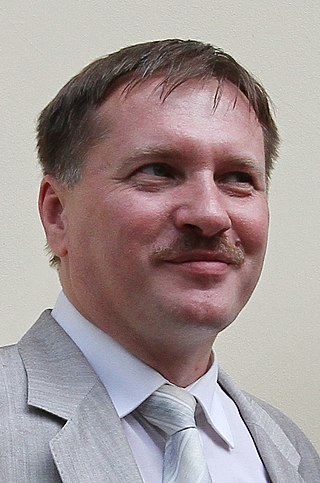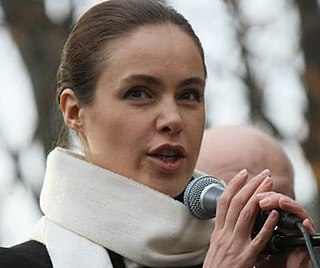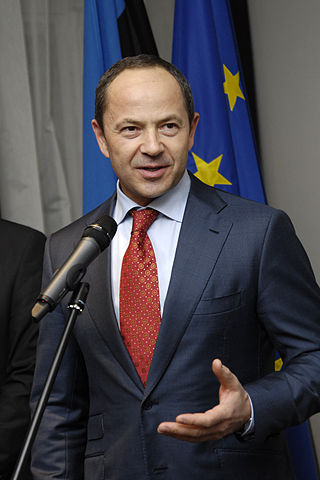
Viktor Andriiovych Yushchenko is a Ukrainian politician who was the third president of Ukraine from 23 January 2005 to 25 February 2010. He aimed to orient Ukraine towards the West, European Union and NATO.

The Orange Revolution was a series of protests that lead to political upheaval in Ukraine from late November 2004 to January 2005. It gained momentum primarily due to the initiative of the general population, sparked by the aftermath of the 2004 Ukrainian presidential election run-off which was claimed to be marred by massive corruption, voter intimidation and electoral fraud. Kyiv, the Ukrainian capital, was the focal point of the movement's campaign of civil resistance, with thousands of protesters demonstrating daily. Nationwide, this was highlighted by a series of acts of civil disobedience, sit-ins, and general strikes organized by the opposition movement.

Elections in Ukraine are held to choose the president, Verkhovna Rada (legislature), and local governments. Referendums may be held on special occasions. Ukraine has a multi-party system, often no single party has a chance of gaining power alone, and parties must work with each other to form coalition governments.

Yulia Volodymyrivna Tymoshenko is a Ukrainian politician, who served as Prime Minister of Ukraine in 2005, and again from 2007 until 2010; the first and only woman in Ukraine to hold that position. She has been a member of the Verkhovna Rada as People's Deputy of Ukraine several times between 1997 and 2007, and presently as of 2014, and was First Deputy Prime Minister of Ukraine for the fuel and energy complex from 1999 to 2001. She is a Candidate of Economic Sciences.

Petro Mykolayovych Symonenko is a Ukrainian politician and the First Secretary of the Central Committee of the Communist Party of Ukraine. Symonenko was the party's candidate in the 1999 and 2004, 2010, and until his withdrawal, the 2014 Ukrainian presidential elections. The Central Election Commission of Ukraine prohibited his candidacy for the 2019 Ukrainian presidential election due to the fact that the statute, name, and symbolism of his party did not comply with the decommunization laws in Ukraine.

The Party of Regions is a banned pro-Russian political party in Ukraine formed in late 1997 that became the largest party in Ukraine between 2006 and 2014.
The All-Ukrainian Union "Fatherland", referred to as Batkivshchyna, is a political party in Ukraine led by People's Deputy of Ukraine, former Ukrainian Prime Minister Yulia Tymoshenko. As the core party of the former Yulia Tymoshenko Bloc, Batkivshchyna has been represented in the Verkhovna Rada since Yulia Tymoshenko set up the parliamentary faction of the same name in March 1999. After the November 2011 banning of the participation of blocs of political parties in parliamentary elections, Batkivshchyna became a major force in Ukrainian politics independently.

Yuriy Ivanovych Yekhanurov is a Ukrainian politician who was Prime Minister of Ukraine from 2005 to 2006 and Minister of Defense from 2007 to 2009.

Agrarian Party of Ukraine is a centre-right agrarian and liberal-conservative political party in Ukraine, led by the former People's Deputy of Ukraine Mykhailo Poplavskyi since 12 June 2020. Formally founded in 1996, this Agrarian Party has been revived in October 2006 and was legally registered as a party by the Ministry of Justice in the November same year.

Presidential elections were held in Ukraine on 17 January 2010. As no candidate received a majority of the vote, a run-off election was held between Prime Minister Yulia Tymoshenko and opposition leader Viktor Yanukovych on 7 February.

Taras Viacheslavovych Chornovil is a Ukrainian politician who served as a People's Deputy of Ukraine from 2000 to 2012. The son of Ukrainian Soviet dissident leader Viacheslav Chornovil, Chornovil was first elected to the Verkhovna Rada as a member of the People's Movement of Ukraine before joining the Party of Regions during the Orange Revolution, later becoming an independent in 2008.

The European Party of Ukraine is a Ukrainian political party registered by the Ministry of Justice on August 3, 2006. Its ideology is social-liberalism, when the state should maintain harmonious social relations: create appropriate conditions for free competition, to prevent the formation of market monopolies and protect the vulnerable population strata. They advocate reforms that they claim will increase social standards of life of Ukrainians to the European level. They support integration of Ukraine into the European Union. Initially, the party was headed by Mykola Moskalenko. In August 2013 the party had more than 5,000 members. The party did not take part in national elections since 2012.
The Party of Free Democrats is a political party in Ukraine led by Mykhailo Brodskyy. It was registered in November 1999 as Yabluko. The party has about 1,000 members.

Parliamentary elections were held in Ukraine on 28 October 2012. Because of various reasons, including the "impossibility of announcing election results" various by-elections have taken place since. Hence, several constituencies have been left unrepresented at various times.

Natalia Yuriivna Korolevska is a Ukrainian politician and former Minister of Social Policy of Ukraine. Since 23 December 2011, she has been the party-leader of the Ukrainian Social Democratic Party. On 22 March 2012, the Ukrainian Social Democratic Party was renamed Party of Natalia Korolevska "Ukraine – Forward!". Korolevska has been a people's deputy in Ukraine's parliament for four of its convocations until, during the 9th Ukrainian Verkhovna Rada, her mandate was terminated on her own request in February 2023.

Serhiy Leonidovych Tihipko is a Ukrainian businessman and politician who was Vice Prime Minister of Ukraine. After founding the TAS Group conglomerate in 1998, Tihipko was Minister of Economics in 2000 and subsequently served as Governor of the National Bank of Ukraine from 2002 to 2004. He ran unsuccessfully for President of Ukraine in the 2010 presidential election and participated in the 2014 presidential election, in which he placed fifth with 5.23 percent of the vote. Tihipko is also former Vice Prime Minister and Minister of Social Policy.
Vasyl Protyvsikh is a Ukrainian politician. He is best known as a self-nominated candidate in the 2010 Ukrainian presidential election, for which he changed his second name to Protyvsikh. During the 2010 election he received 0.16% of the votes.

The 2010 Ukrainian local elections took place on 31 October 2010, two years before the 2012 general election. The voter turnout across Ukraine was about 50%, which is considered low in comparison to previous elections.

Snap presidential elections were held in Ukraine on 25 May 2014 and resulted in Petro Poroshenko being elected President of Ukraine. Originally scheduled to take place on 29 March 2015, the date was brought forward following the 2014 Ukrainian revolution. Poroshenko won the elections with 55% of the vote, enough to win in a single round. His closest competitor, Yulia Tymoshenko, received 13% of the vote. The Central Election Commission reported voter turnout over 60%, excluding the regions not under government control. Since Poroshenko obtained an absolute majority in the first round, a run-off second ballot was unnecessary.

Oleh Valeriiovych Liashko is a Ukrainian politician, journalist and soldier who was a long time member of the Verkhovna Rada and leader of the Radical Party.

















